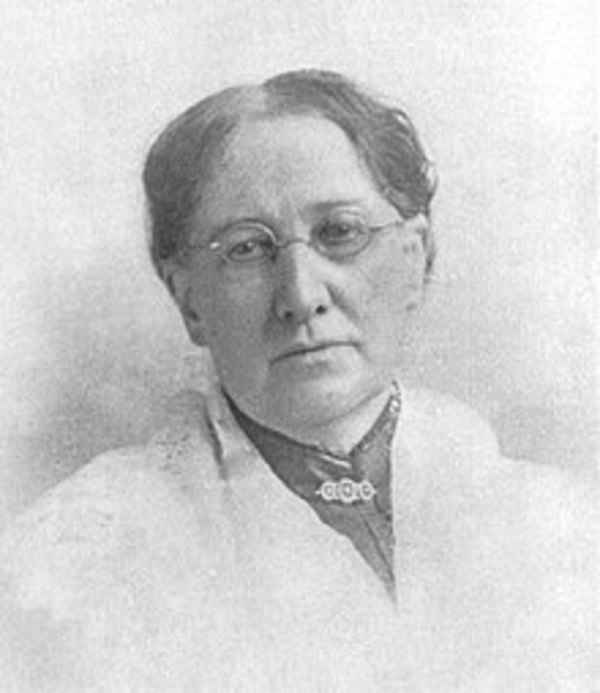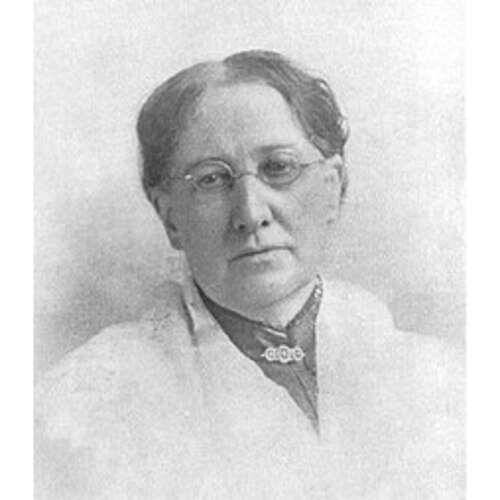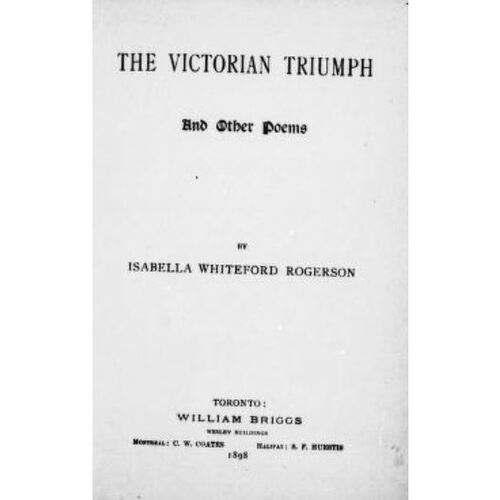
Source: Courtesy of Wikimedia Commons
WHITEFORD, ISABELLA (Rogerson), poet and philanthropist; b. 3 Jan. 1835 in Fair Head, County Antrim (Northern Ireland), daughter of Alexander Whiteford and Isabella Mathers; m. 1879 James Johnstone Rogerson; they had no children; d. 2 Feb. 1905 in St John’s.
Isabella Whiteford’s was a long-established family of Fair Head, where her grandfather, also Alexander, had been among the first adherents of the Church of Ireland to open their doors to the celebrated Methodist evangelist Gideon Ouseley. In 1850 her parents emigrated to Newfoundland leaving two adult sons by an earlier marriage in Ulster; two sons of the second marriage and four daughters, Isabella being the second youngest, accompanied them to the colony. In St John’s her father was engaged “wholly to the work of the Methodist church” in a lay capacity as circuit steward and trustee. But what the surviving records testify to most vividly is “his warm, generous Celtic nature” and the enchantment of his hospitality, both in town and at his delightful country retreat, Dunluce. One aged memorialist especially recalled the presence of Isabella, the poet.
She had two predecessors as a published poet of Newfoundland: Henrietta Prescott, daughter of Governor Henry Prescott* and author of Poems, written in Newfoundland (London, 1839), and Mrs M. S. Peace, who wrote The convict ship and other poems (Greenock, Scot., 1850). Both were briefly resident in the island. Isabella Whiteford, already a writer of verse on her arrival at the age of 15, published her first volume, Poems (1860), in Belfast. It contains some 120 poems, mostly written in the colony and divided equally between Irish and Newfoundland scenes and subjects. They are Wordsworthian in diction and form, and they display a genuine, if not strong, talent, as in “Three scenes in every-day life”:
She was so simply beautiful
The village pastor’s child,
It seemed, where’r she turned her face,
Eternal summer smiled.
A later collection, The Victorian triumph and other poems (1898), was issued in Toronto and has an even stronger colouring of her adopted land. There are, as in her first volume, accomplished landscape pieces, childhood recollections, seasonal celebrations, exercises in the manner of her admired poets, renderings of biblical scenes, and lyrical pieces. But many of the poems deal with activities she shared with her husband, a lay church leader and philanthropist, for this is in part a communal volume reflecting with singular charm the busy round of the Church Woman’s Missionary Society, over which she presided, and the Methodist class she led weekly for many years. “A plea for a sailors’ home” (an institution actually realized), birthday pieces for friends, verses in memoriam, epithalamia, as well as compositions of private experience and reflection, and memories of Ireland, recalled in the colonial home her father had established half a century before, round out the collection.
The literary genre her work represents lies somewhat untidily between the high art of academic studies, the oral literature of the folklorist, and (occasionally) the popular verse of regional newspaper and magazine. Yet it commands some attention. In the Newfoundland of her adult years, these categories were blurred and uneven, and “Our Isabella,” as she was universally known, was a figure of note at a time which began to witness the emergence of a distinctive Newfoundland literary and intellectual culture.
[The preface to Isabella Whiteford Rogerson’s 1898 collection of poetry was prepared by Daniel Woodley Prowse*. Some of her poems also appear, together with traditional Newfoundland verse and ballads, in what seems to be a unique copy of an early songster, acquired by the author some years ago. The cover and title-page are missing from this well-thumbed volume, but it bears the running title Coronation songster, and was probably edited by James Murphy and published at St John’s around 1902. On the matter of levels of poetic effort, the author is indebted to Pauline Greenhill’s study, True poetry: traditional and popular verse in Ontario (Montreal, 1989). g.m.s.]
Lit. hist. of Canada (Klinck et al.; 1976–90), 1: 85. Methodist Monthly Greeting (St John’s), September 1903; March 1905 [obit. by the Reverend James Dove, and obit. poem by Sir Robert Thorburn]. The Oxford companion to Canadian literature, ed. William Toye (Toronto, 1973), 549–50.
Cite This Article
G. M. Story, “WHITEFORD, ISABELLA (Rogerson),” in Dictionary of Canadian Biography, vol. 13, University of Toronto/Université Laval, 2003–, accessed March 29, 2025, https://www.biographi.ca/en/bio/whiteford_isabella_13E.html.
The citation above shows the format for footnotes and endnotes according to the Chicago manual of style (16th edition). Information to be used in other citation formats:
| Permalink: | https://www.biographi.ca/en/bio/whiteford_isabella_13E.html |
| Author of Article: | G. M. Story |
| Title of Article: | WHITEFORD, ISABELLA (Rogerson) |
| Publication Name: | Dictionary of Canadian Biography, vol. 13 |
| Publisher: | University of Toronto/Université Laval |
| Year of revision: | 1994 |
| Access Date: | March 29, 2025 |




